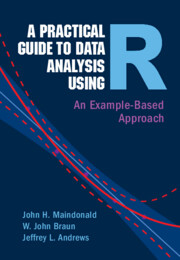Refine search
Actions for selected content:
25 results
This is who we are: The role of military ethics, culture, and religion in disseminating international humanitarian law to the armed forces
-
- Journal:
- International Review of the Red Cross / Volume 107 / Issue 928 / April 2025
- Published online by Cambridge University Press:
- 07 May 2025, pp. 256-286
- Print publication:
- April 2025
-
- Article
-
- You have access
- Open access
- HTML
- Export citation

A Practical Guide to Data Analysis Using R
- An Example-Based Approach
-
- Published online:
- 11 May 2024
- Print publication:
- 30 May 2024
Part 3 - Systems Based Overview of Cancer Complications
-
- Book:
- Pocket Guide to Oncologic Emergencies
- Published online:
- 10 August 2023
- Print publication:
- 24 August 2023, pp 43-284
-
- Chapter
- Export citation
7 - Meow and More
-
- Book:
- Purrieties of Language
- Published online:
- 06 April 2023
- Print publication:
- 27 April 2023, pp 173-198
-
- Chapter
- Export citation
4 - Responsibility
-
- Book:
- Ethics and Business
- Published online:
- 22 December 2022
- Print publication:
- 05 January 2023, pp 98-135
-
- Chapter
- Export citation
Chapter 1 - What Is Pragmatics?
-
- Book:
- Pragmatics in English
- Published online:
- 29 December 2022
- Print publication:
- 29 December 2022, pp 1-24
-
- Chapter
- Export citation
4 - The Code
- from Part II
-
- Book:
- Islamic Law in Circulation
- Published online:
- 24 March 2022
- Print publication:
- 31 March 2022, pp 129-172
-
- Chapter
- Export citation
Chapter 6 - Telegraphy
- from Part I - Aspects of Style
-
-
- Book:
- On Style in Victorian Fiction
- Published online:
- 23 December 2021
- Print publication:
- 06 January 2022, pp 93-108
-
- Chapter
- Export citation
Moral Status for Malware! The Difficulty of Defining Advanced Artificial Intelligence
-
- Journal:
- Cambridge Quarterly of Healthcare Ethics / Volume 30 / Issue 3 / July 2021
- Published online by Cambridge University Press:
- 10 June 2021, pp. 517-528
-
- Article
- Export citation
Chapter 8 - Law and philosophy after 50 bce
-
- Book:
- Law and Philosophy in the Late Roman Republic
- Published online:
- 29 April 2021
- Print publication:
- 03 June 2021, pp 126-133
-
- Chapter
- Export citation
2 - Shannon Entropy
-
- Book:
- Entropy and Diversity
- Published online:
- 21 April 2021
- Print publication:
- 22 April 2021, pp 32-61
-
- Chapter
- Export citation
8 - VBA Editing and Code Development
- from Section 4 - Advanced Automation and Interfacing
-
- Book:
- Excel Basics to Blackbelt
- Published online:
- 08 May 2020
- Print publication:
- 28 May 2020, pp 307-361
-
- Chapter
- Export citation
4 - The Comparison of Structures and the Comparison of Systems
- from Part II - Regional Comparisons
-
-
- Book:
- Comparing Cultures
- Published online:
- 08 May 2020
- Print publication:
- 28 May 2020, pp 93-116
-
- Chapter
- Export citation
10 - Law and Legal Automation in the World State
-
- Book:
- Monitoring Laws
- Published online:
- 08 November 2019
- Print publication:
- 24 October 2019, pp 178-184
-
- Chapter
- Export citation
Mandatory versus Discretionary Rule Dichotomy in the Harmonization of Corporate Governance Codes: Lessons for Nigeria
-
- Journal:
- Journal of African Law / Volume 63 / Issue 3 / October 2019
- Published online by Cambridge University Press:
- 20 November 2019, pp. 385-411
- Print publication:
- October 2019
-
- Article
- Export citation
Chapter 2 - Organisations: structure and culture
- from Part One - Understanding communication
-
- Book:
- Communication Skills for Business Professionals
- Published online:
- 06 April 2020
- Print publication:
- 12 June 2019, pp 24-55
-
- Chapter
- Export citation
Challenges 12–19 - If Statements
- from Part I - Learning Python
-
- Book:
- Python by Example
- Published online:
- 28 May 2019
- Print publication:
- 16 May 2019, pp 17-23
-
- Chapter
- Export citation
5 - Values and ethics for critical practice
-
- Book:
- Engaging with Social Work
- Published online:
- 15 March 2019
- Print publication:
- 17 January 2019, pp 131-160
-
- Chapter
- Export citation
12 - Nursing as a profession
- from Part II - Becoming
-
- Book:
- The Road to Nursing
- Published online:
- 05 December 2019
- Print publication:
- 19 October 2018, pp 183-203
-
- Chapter
- Export citation
The Maltese cross: A new simplistic model for memory
-
- Journal:
- Behavioral and Brain Sciences / Volume 7 / Issue 1 / March 1984
- Published online by Cambridge University Press:
- 04 February 2010, pp. 55-68
-
- Article
- Export citation
